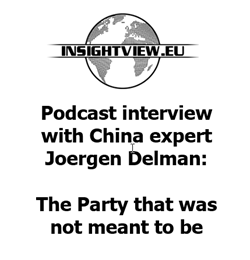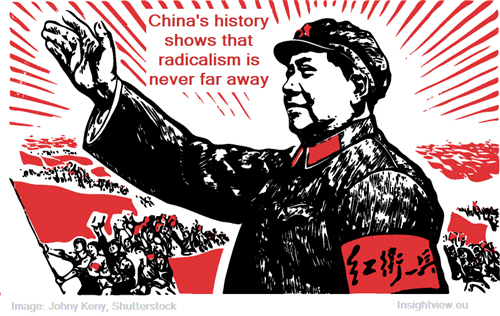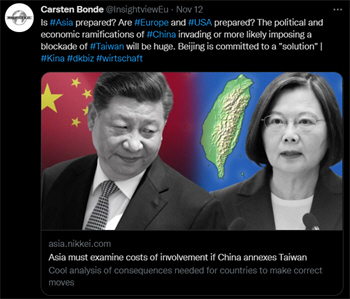Insightview.eu has invited Joergen Delman, professor emeritus, PhD, China Studies, Department of Cross-Cultural and Regional Studies, University of Copenhagen, to write about the just-ended Communist Party Central Committee meeting in Beijing. In this article, Joergen Delman writes about the new interpretation of the Communist Party's history and how President Xi Jinping's rise continues.
Joergen Delman works on China's political economy, politics, civil society, climate and energy politics, and environmental issues. He is a frequent public speaker and media commentator on these topics and lived in China for ten years, working as a consultant and director for international development organisations, as well as Danish and international businesses. He has worked with and within Chinese government organisations at the central and local level. Joergen Delman is a co-coordinator of ThinkChina.dk.
A Communist Party resolution dated November 11 on the history of China's Communist Party hails
Xi Jinping as the most successful leader in the history of the Party. The resolution was passed by the top elite body of the Party, the Central Committee, which has 197 members and 151 candidate members. They gathered 8-11 November to agree on how to interpret and communicate the Communist Party's history.
The Party's 100th anniversary was the formal occasion for adopting this important document. It was the third such resolution in the history of the Party. The first one was adopted in 1945 and confirmed Mao Zedong's leadership and the political course that should lead to the establishment of the new China. Deng Xiaoping was the mastermind behind the second resolution in 1981. He had to address the political mistakes of the Cultural Revolution, assess Mao Zedong's historical contribution for good and for bad, and finally pave the way for China's transformation into an open market economy and the dismantling of key socialist institutions.
The
current third resolution was announced in a communiqué from the Central Committee meeting that presented a summary of the resolution. Publication of the resolution in full is still pending.
Party in positive mode
The resolution focuses on the positive experiences of the Communist Party through its 100 years of history and the Party's major contributions to the development of China as a strong, politically and socially stable, and relatively well-off country.
The
Party certainly has a lot to be proud of at the time of its 100th anniversary. The Party kicked out the foreign powers from Chinese territory and ended about 100 years of national humiliation in the late 1940es. The Communists won the civil war against the Nationalists [Guomindang] in 1949. The Party has held the power over China as a sovereign territory for more than 70 years. It kept the Party and the country together despite enormous difficulties, challenges, political mistakes, severe internal rifts and threatening social protest movements along the road. The
CPC has delivered peace and stability on the Chinese territory and expanded it by acquiring Hong Kong and Macao back, and the Party has modernised China, brought economic and social progress, and eradicated poverty at a speed never seen in the world before. Under Communist Party leadership, China has become a major power and now speaks up against and demands respect from the US.
The leaders who made it into the resolution
The narrative of the resolution is built around the leaders in Party history, who are still recognised and who are behind the successes that have led China to where it is. There are five of them -
Mao Zedong,
Deng Xiaoping,
Jiang Zemin,
Hu Jintao, and
Xi Jinping. There have been more leaders, of course, but they have been excluded because they were removed from their incumbent positions and then erased from party history due to political mistakes. Examples are the
Gang of Four during the Cultural Revolution and
Zhao Ziyang in 1989. Other leaders have been seen as relatively unimportant, transitional figures, like
Hua Guofeng who succeeded Mao Zedong.
The victorious narrative in the resolution renders a fair and familiar description of the achievements of each of the five recognised leaders. At the same time, the text is completely devoid of criticism of anybody or anything that could potentially bring this version of the Party's superior historical accomplishments into question. Such thorny issues were not shied away from in the previous resolutions. The text has thus brought the Communist Party's spin to a new level and is not to be consulted for historical accuracy or factual and balanced historical accounting.
Xi takes full control of Party history
The international press, such as
South China and Morning Post and
BBC seem to agree that the resolution was made to bolster
Xi Jinping's historical record in China's modern political history and to put him on a par with Mao Zedong and Deng Xiaoping at the expense of his two immediate predecessors, Jiang Zemin and Hu Jintao. The analyses conclude that the resolution would legitimate
Xi Jinping's presumed claim to a new 5-year period as leader of the Party and China from next year, and possibly even longer.

While the latter is a reasonable assumption, there is more to it. While the resolution was fair to all leaders and used recognisable vocabulary, slogans and buzzwords ascribable to each of them, it is noteworthy that the five were not accorded equal weight in the resolution. In historical order, the volume of text describing each leader's achievements roughly amounted to the following shares: Mao Zedong 12%, Deng Xiaoping 5%, Jiang Zemin 4%, Hu Jintao 3%, and
Xi Jinping 28 %. Xi clearly overshadows the others by a large margin. In a highly formalised political culture like the Chinese, the implications of this simple word count should not be underestimated.
In fact, it is logical to conclude that the aim of the resolution was not to put
Xi Jinping on a par with Mao Zedong and Deng Xiaoping, since that had already happened earlier, especially through the revision of the
Party Statute in 2017 and of the
Constitution of the People's Republic in 2018. Actually, at the end of the Party's first century
Xi Jinping has been made to outshine the two previous iconic leaders, Mao and Deng. The resolution thus elevates the narrative praising
Xi Jinping to a new level by implying that he is the most important Communist leader of China until now. He is the leader who has laid the groundwork for ensuring that the Party should be able to stay in power for the next 100 years.
A well-oiled political machineThe resolution allows
Xi Jinping to take complete control over the interpretation of his own place in the Communist Party's and Chinese history. The Resolution notes that he has managed to rectify and re-create the Party through a "self revolution" into what he thinks it should be like, i.e. a streamlined and loyal political machine that focuses on delivering more and better public goods and services to the Chinese people during the next stage of China's development. The Party is united behind him, it is claimed, it holds high its proud tradition of fighting to win its battles and it maintains its vigilance against internal and external enemies while concentrating on doing its job. As the text notes: "[the Party] lives from fighting and dies from indulgence in the good life."

It could be argued that
Xi Jinping presides over what may be called the most successful one-party state that the world has seen throughout the history of political parties. Although he has centralised a lot of power in his own hands, he is not to be seen as a dictator, but the first inter pares. At a
meeting with key stakeholders on November 12, Xi made sure to note that the Party leadership had the necessary broad support for the resolution before the Central Committee met in Beijing. He explained that the resolution was the result of a long process of hearings and consultations within the Party and with representatives of various interests in society, thus implying that he did not dictate the text alone.
Outside disturbances
The Central Committee meeting was held behind hermetically closed doors and with no public access to news about it until it was over. Therefore, the Chinese people remain uninformed - as is usual during such Party meetings - about possible debates about the resolution or corrections made to it by Central Committee members. The Party's version of democracy does not entertain the idea of public insight into its inner dealings.
For obvious reasons,
Xi Jinping and the top leadership do not have many public critics in China, but some do speak up occasionally and are mostly suppressed. This also happened around the Central Committee Meeting. On November 2, world-famous tennis star
Peng Shuai put up a message on her official Weibo account that accused former Vice Premier and member of China's previous Standing Committee of the Politbureau,
Zhang Gaoli, of sexual assault. Peng Shuai described mutual attraction, sexual abuse, later estrangement, and lots of anxiety and self-hate. The relationship started before Zhang Gaoli became a member of the Politbureau in 2012. After that, Zhang cut ties with Peng, but when he retired in 2017, the relationship resumed. Apparently, it lasted until November 2 this year when Zhang did not honour an appointment to talk about a crisis in their relationship. The tone of Peng Shuai's text was that of a Metoo victim. Chinese
feminist Lü Pin supported Peng Shuai, and argued that: "[the case] exposes the real life of Chinese highest cadres, on how their power masked their hypocrisy, and how they are excessively corrupted".

Peng Shuai has since been scrapped from the net and is not available for comments. As a retiree, Zhang Gaoli retains his high rank in the Party, and although this criticism did not target
Xi Jinping directly, it came inconveniently right before the high-level Party meeting, and it is still Xi's business to deal with Zhang.
While cases of corrupt social and sexual behaviour within China's political elite are common, the Party normally preserves the right to disclose them only when a leader ends up in a corruption case. Peng Shuai thus displayed immense courage, but also naiveté by going public with her story and criticism of Zhang Gaoli. Under the current circumstances, her laments will never be allowed to gather social media momentum, and the story will unquestionably lead to severe personal repercussions. We may never know which. Neither Xi or the Party has commented on the story.
China's zero-tolerance policy against the COVID 19 has helped China contain the pandemic successfully so far, although sporadic outbreaks occur around the country now. This success was also lauded in the resolution. However, Guan Yi, director of the State Key Laboratory of Emerging Infectious Diseases at Shantou University, which runs his lab in partnership with the University of Hong Kong, took this approach to task in an interview with Phoenix TV in Chinese on November 8. He argued that: "We don't stand a chance if we pursue a target of zero COVID", and he went on: "We should not declare victory over this virus too early, or we would be underestimating its impact on mankind". Finally, he advised that: "Don't blame the virus for being stealthy, we just consider ourselves smarter than we really are". These views would of course be worthwhile deliberating, but they came at a time when the Communist Party leadership devoted all attention to historical issues, and they must have been a real nuisance since they challenged
Xi Jinping's status as the master of COVID 19 crisis management. For the time being,
there is no chance that China's strategy will change. The occasional flare-ups are still squashed with aggressive curbs to ensure public safety and the economy's health, and the borders largely remain closed.
Looking into the futureNobody is perfect, obviously, but according to the resolution, Xi is a flawless leader. The Party declares that it stands fully behind him. He has brought the Chinese version of Marxist theory to a new level as a guide to China's successful development, and he is endorsed as the core leader at the centre of the leadership as well as of the entire Party.
The resolution does not promise anything new under
Xi Jinping's continued leadership. The policies are in place. China is still on the way to realising the goals of the Chinese Dream, i.e. becoming a strong, harmonious, democratic, and rich socialist country. It is often speculated that a successful reunification with Taiwan would be the biggest jewel in
Xi Jinping's already sizeable crown. However, the resolution does not comment directly on reunification with Taiwan. Surprisingly, it only notes that the Party will fight Taiwanese separatism.

Amidst the praise, it is pertinent to ask whether
Xi Jinping is overstretching his political capital? While there are no signs of internal disagreement within the Party leadership, it is surprising that the resolution does not deal with the fact that many Chinese have suffered wrongly or unduly under the "people's
democratic dictatorship" which is the formal name of China's political order. In fact, the resolution does not mention the nature of the political order that the Party has created to uphold its power and which has allowed it to be so successful.
It is not difficult to imagine that those suppressed under various political campaigns, who were sent to jail or camps for political reasons, or whose voices were quelled because of their public engagement with contentious issues are unhappy with the approach of the Party. It is also conceivable that younger potential political leaders are not happy with the prospects of not being able to compete for leadership of the Party at the right time of their career since
Xi Jinping seems intent on staying in power. Therefore, we cannot rule out that political disagreement or even unrest may happen at some future point in time.
Finally, the Central Committee communiqué announced that the 20th Party Congress will be held in the second half of 2022. The Congress will be a defining moment in China's and
Xi Jinping's history, since it will decide whether to reelect Xi as General Secretary of the Communist Party in contravention of the previous 10-year term limit that was instituted by Deng Xiaoping.
8. October 2021 - Podcast interview with Stig Thoegersen, China expert: Is Beijing's policy of common prosperity just a policy tool to retain power?
6. September 2021 - China: The Second Cultural Revolution?
8. July 2021 - Podcast interview with China expert Joergen Delman: The Party that was not meant to be
13. March 2021 - By Invitation: China's annual NPC meeting in the shadows of the Communist Party's 100th anniversary
13. March 2021 - Podcast interview with three China experts about the just-ended NPC Two Sessions meeting in Beijing. China-EU investment deal at risk? Taiwan next in line with the 'reunification' plan? China backpedalling on carbon emission?







 While the latter is a reasonable assumption, there is more to it. While the resolution was fair to all leaders and used recognisable vocabulary, slogans and buzzwords ascribable to each of them, it is noteworthy that the five were not accorded equal weight in the resolution. In historical order, the volume of text describing each leader's achievements roughly amounted to the following shares: Mao Zedong 12%, Deng Xiaoping 5%, Jiang Zemin 4%, Hu Jintao 3%, and Xi Jinping 28 %. Xi clearly overshadows the others by a large margin. In a highly formalised political culture like the Chinese, the implications of this simple word count should not be underestimated.
While the latter is a reasonable assumption, there is more to it. While the resolution was fair to all leaders and used recognisable vocabulary, slogans and buzzwords ascribable to each of them, it is noteworthy that the five were not accorded equal weight in the resolution. In historical order, the volume of text describing each leader's achievements roughly amounted to the following shares: Mao Zedong 12%, Deng Xiaoping 5%, Jiang Zemin 4%, Hu Jintao 3%, and Xi Jinping 28 %. Xi clearly overshadows the others by a large margin. In a highly formalised political culture like the Chinese, the implications of this simple word count should not be underestimated. It could be argued that Xi Jinping presides over what may be called the most successful one-party state that the world has seen throughout the history of political parties. Although he has centralised a lot of power in his own hands, he is not to be seen as a dictator, but the first inter pares. At a meeting with key stakeholders on November 12, Xi made sure to note that the Party leadership had the necessary broad support for the resolution before the Central Committee met in Beijing. He explained that the resolution was the result of a long process of hearings and consultations within the Party and with representatives of various interests in society, thus implying that he did not dictate the text alone.
It could be argued that Xi Jinping presides over what may be called the most successful one-party state that the world has seen throughout the history of political parties. Although he has centralised a lot of power in his own hands, he is not to be seen as a dictator, but the first inter pares. At a meeting with key stakeholders on November 12, Xi made sure to note that the Party leadership had the necessary broad support for the resolution before the Central Committee met in Beijing. He explained that the resolution was the result of a long process of hearings and consultations within the Party and with representatives of various interests in society, thus implying that he did not dictate the text alone. Peng Shuai has since been scrapped from the net and is not available for comments. As a retiree, Zhang Gaoli retains his high rank in the Party, and although this criticism did not target Xi Jinping directly, it came inconveniently right before the high-level Party meeting, and it is still Xi's business to deal with Zhang.
Peng Shuai has since been scrapped from the net and is not available for comments. As a retiree, Zhang Gaoli retains his high rank in the Party, and although this criticism did not target Xi Jinping directly, it came inconveniently right before the high-level Party meeting, and it is still Xi's business to deal with Zhang. Amidst the praise, it is pertinent to ask whether Xi Jinping is overstretching his political capital? While there are no signs of internal disagreement within the Party leadership, it is surprising that the resolution does not deal with the fact that many Chinese have suffered wrongly or unduly under the "people's democratic dictatorship" which is the formal name of China's political order. In fact, the resolution does not mention the nature of the political order that the Party has created to uphold its power and which has allowed it to be so successful.
Amidst the praise, it is pertinent to ask whether Xi Jinping is overstretching his political capital? While there are no signs of internal disagreement within the Party leadership, it is surprising that the resolution does not deal with the fact that many Chinese have suffered wrongly or unduly under the "people's democratic dictatorship" which is the formal name of China's political order. In fact, the resolution does not mention the nature of the political order that the Party has created to uphold its power and which has allowed it to be so successful.